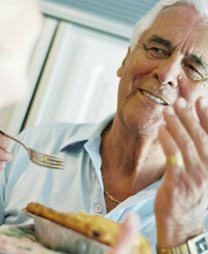|
|
Food Classes Give Elderly Men Confidence
By J. M. Hirsch, Associated Press
May 26, 2004

Laconia, New Hampshire: Frank Binette didn't realize just how ill-prepared he was for life without his wife until he stepped up to the stove for the first time after her death.
"My wife and I were married 62 years and she would never let me in the kitchen," the 86-year-old said. "So when she passed away two years ago all I could make was a cup of coffee. I was handicapped."
For many men of Binette's generation, cooking is the purview of women. But when they outlive their wives, or become their caretakers, that culinary ignorance can mean more than the loss of some of life's simple pleasures. It can lead to poor diets that exacerbate or cause serious health problems.
A growing recognition that kitchen confidence can be critical to the health of older men has medical and social service agencies around the country offering classes to help get them cooking.
Binette, who especially missed his wife's scrambled eggs, enrolled last month in a cooking class offered by a local hospital. A few classes later, he's making eggs several times a week. "Now it's so easy," he says.
It's more than a matter of taste, said John Morley, director of geriatrics at Saint Louis University School of Medicine. It's also good medicine. Elderly men who can cook tend to be healthier because they eat better and are more social.
Though there is little data on the subject, Morley estimates as many as a third of American men over the age of 80 - more than 1 million people - face nutrition-related health concerns because of an inability to cook for themselves.
Men who can't cook are more likely to rely on fast or frozen foods, or even skip meals, according to Sue Moors, a dietitian and spokeswoman for the American Dietetic Association.
Those habits not only lead to bad nutrition, but also can interfere with prescription medicines, she said.
Though researchers have advocated such classes for years, they only recently began showing up around the country.
Judy Whiteman, who coordinates programs for the elderly in Broome County, N.Y., used federal grants in 2001 to create a free cooking and nutrition class for men caring for infirm wives.
But as the broader need became more apparent, the "Men Making Meals" course was opened to widowers and men whose wives were concerned about what would happen if their husbands had to fend for themselves.
"A lot of them didn't have any idea how to shop for a meal," Whiteman said. "Even something as simple as washing the top of a can before you open it might not occur to someone who has never been in a kitchen."
More than 100 men have completed Whiteman's program. People from around the country have called her, hoping to start similar classes. She estimates there are several dozen programs nationally.
Classes generally are small to make sure everyone gets time at the stove. But Whiteman said the real appeal is her assurance that the only woman in the class will be the teacher, since many older men would be intimidated by female classmates.
Courses generally cover everything from basic knife skills to how to read recipes, as well as meal planning, grocery shopping, nutrition and healthy convenience foods. Classes usually end with participants eating the meal they prepared.
That's when Binette learned his most surprising lesson.
"I went up with the idea that the food would be lousy if guys were a part of it," he said. "But it was good."
Though he praised programs such as Meals on Wheels, which deliver prepared food to seniors' homes, Morley sees greater value in classes, which teach self-sufficiency and encourage participants to socialize.
Men often socialize less after their wives are gone, he said. That can create a dangerous cycle of depression and diminished appetite, both of which can become serious health concerns. Knowing how to cook also means living life independently.
Self-sufficiency actually can be harder for senior men than women, said Rosemary Blieszner, a professor of human development at Virginia Tech in Blacksburg, Va.
While the independent living skills older women might lack - such as home maintenance - are easily hired out, it can be more difficult, more expensive and less nutritious for men to regularly eat out or live on frozen meals, Blieszner said.
At the same time, she thinks this is an issue that will be less of a problem in future years because baby boomers and younger generations have more flexible notions of work around the home.
That's a lesson 61-year-old Roger Ballantyne is learning. He took the class with Binette at his wife's insistence. He's about to retire, but she plans to continue working and wanted him to help with the cooking.
So far both are pleased with the results. He's made her meat loaf, a breakfast casserole, even cookies.
"I always figured my wife and I would retire at the same time and she would be there to cook," he said. "I never anticipated that I'd have to cook for myself and at some point cook for my wife."
|
|



